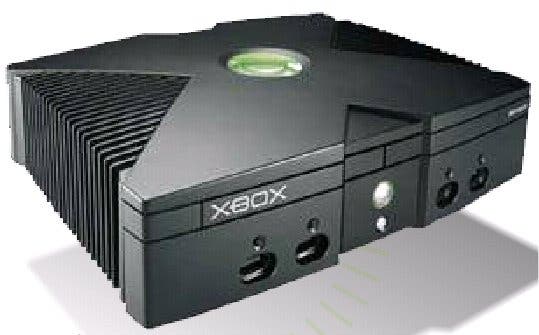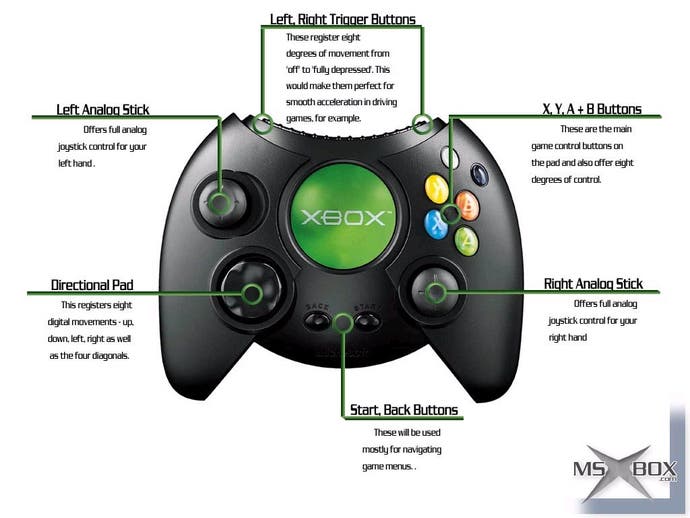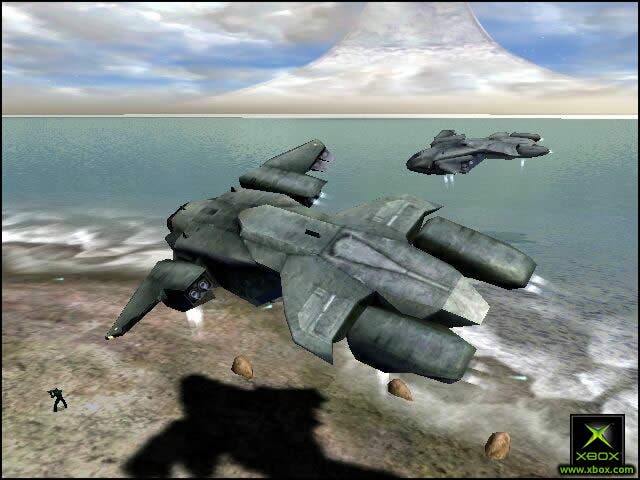Out-boxed?
Article - Microsoft's Xbox met with a chilly reception at E3 a fortnight ago, but why?
It never looked good for Microsoft. That's the verdict we're forced to pass on the Xbox after its press coverage at E3. They made all the big announcements first; release date, price, hardware and software, leaving Nintendo to mop up in a big way, with a number of cheap marketing shots to unsteady big M. For example, the patent gamesmanship of announcing a release date three days earlier than Microsoft's minutes after Microsoft concluded their press conference. Having unveiled their controller already, Microsoft were open to a sucker punch in the form of the impressive GameCube controller, which journalists were swooning over within seconds of the doors opening on the first day, this being their first opportunity to actually hold it.

All the while...
On the GameCube front, the press bought the super-sensitive shoulder buttons spin, lapped up the release announcement, adored the software and wrote it all up for first day reports that would have made painful reading in Redmond. Those reports told of how Nintendo undercut Microsoft on price, announced jaw-dropping software and told everyone that hardware should always cost next to nothing, because it's the games people want to play, not the packaging, while Microsoft tried to justify a $299 price tag. Three days after E3 Nintendo announced that its console would launch at $199. And then there were those announcements about the Xbox crashing. Ouch. It's a bit of a Catch 22, in fairness, since it's a pre-production unit running on dodgy alpha/beta games, but as long as it's running on a Microsoft operating system, and it crashes, the press will be there to sensationalize it, whether the same thing was happening five minutes away on the other side of the room with Nintendo and Sony kit, or not. Oh that happened, you just didn't hear about it. So why should anyone give the machine the benefit of the doubt? Although yours truly has been an Xbox supporter for the last year, there are a number of points that confuse and infuriate me about the console's E3 showing. For starters, there are a lot of things one has to take into account about the hardware. From what we've seen, the IGP and MCP parts have to be pretty good, or else NVIDIA wouldn't bother pursuing them beyond the Xbox platform. They certainly wouldn't go to the expense of developing several fully-fledged PC platforms called nForce and renting out HMS Belfast this afternoon for a lunch in its honour…

Hard work
So what do nForce and Xbox have in common apart from the IGP (Integrated Graphics Processor) and MCP (Media and Communications Processor) parts? Not a whole lot. nForce is fundamentally an AMD platform, using Athlon and Athlon 4 with DDR memory, while the Xbox relies on an Intel Pentium III and Rambus born memory. The graphics chip is from the same family, but the Xbox boasts an NV2A, an advanced progression of the GeForce 3, while nForce makes do with a GeForce 2. In the sound category, both the MCP in Xbox and on nForce boards features six channel Dolby Surround sound with AC97 compliance. Both feature onboard 10/100Mbps Ethernet support. HyperTransport 800MBps data transfer between the IGP and MCP chips remains, but on the whole it's a very different system. Memory performance of the nForce is said to be market clinching, which is good news inasmuch as it means HyperTransport makes quite an impression. It was difficult to appreciate the speed of the Xbox at E3 because the software was bloated alpha/beta release code that lacked the optimisation of the games that will eventually be released. The performance of the nForce is unlikely to be comparable to Xbox, but watching HyperTransport in action with the onboard GeForce 2 chip will give us an idea of how the Xbox will be able to cope with memory bandwidth heavy applications via its Unified Memory Architecture system (i.e. its entire games catalogue).
Moving on
Lets take the software under consideration. This is a key area that contributed heavily to the criticism the console received at E3; not because it was poor (although its pre-beta state did mean a few unfortunate crashes and lockups), but because it wasn't presented in a very organised fashion, despite the long-winded press releases on the subject. Many felt Project Gotham was the pick of the bunch, as one journalist put it, defecating on Gran Turismo 3 from a great height. Apart from PG though, Halo and Blood Wake turned a few heads, but none of it was quite up to the standard of the GameCube software on display, particularly Shigeru Miyamoto's ingenious Pikmin, Starfox Adventures and Rogue Leader. Dead or Alive 3 was a star attraction for the press and shown behind closed doors along with Malice, but where, we mused, were the big titles from everybody else. The key to the Xbox's poor reception seems to have been a lack of decent third party software. Games like Jet Set Radio Future were expected to show, then didn't. Lets hope ECTS answers some questions. So where does that leave us? With hardware that perhaps copped too much flak at the time, a hefty price tag and an embarrassing release date concession, but worst of all, a software line up that should have done more to promote third parties.

What can Microsoft do to improve this situation?
The first, and most important thing for many is the price of the console. This, they say, has to change. GameCube is set to launch at $199, and the PlayStation 2 will almost certainly drop to $249, if not $199, leaving the Xbox somewhere up in the clouds. [Editor's note: A day after Tom had submitted this, Sony announced a drop in price, starting Monday. Clearly we don't pay him enough…] Some suggest a conservative change in pricing for Xbox, perhaps increasing the price of the almost mandatory remote control unit while dropping the console price tag by $50, but others say simply bundling a game or anything would be a good start. Something that will sell the console, like Project Gotham. The practice of shipping consoles new with no software is one that was simply unheard of in the olden days of Super Mario All Stars and Virtua Fighter - why not win back some cred by changing tack there? The price will become even more crucial in the immediate run up to the release. With the GameCube and Xbox launching so close to one another, if Xbox cannot offer something more than GameCube or PlayStation 2 at launch, people will simply not bother with it. It's common sense. Given that, software is just as important a point as pricing, and Sony will have a lot of quality software come November, Microsoft need to ramp up their marketing spend by introducing these big killer apps now while their competition is still wrestling with the fundamentals.
Conclusions
There is a school of thought that says that Microsoft will still mop up the American market because of their strong ties with Western developers, an area Nintendo consoles are notoriously poor in. That's a hell of a wager, guys. Hardly something befitting the biggest product launch Microsoft have ever been faced with in the gaming arena. It's amazing to recall that Nintendo executives were even thinking about having their console shelved when you think about it.
-

